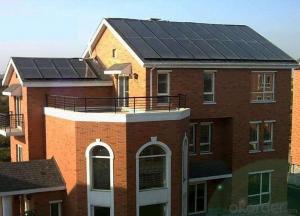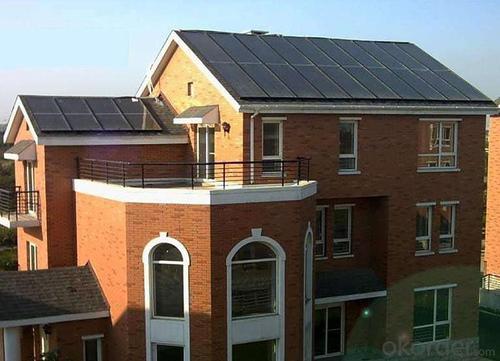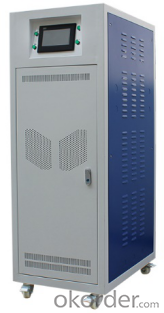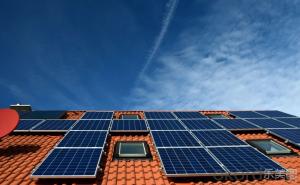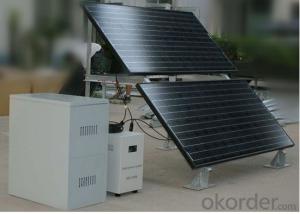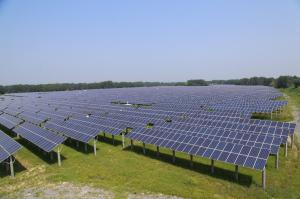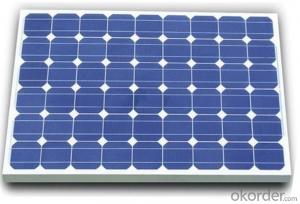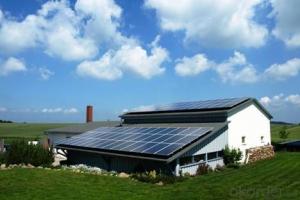25kw Solar Off-Grid Power System - Solar Energy Systems Bowral
- Loading Port:
- China main port
- Payment Terms:
- TT OR LC
- Min Order Qty:
- 1 set
- Supply Capability:
- 500 set/month
OKorder Service Pledge
OKorder Financial Service
You Might Also Like
Specification
1. Technical parameters of 5kw Solar Off-grid Power System 25KW
-Solar panels
Power(Pmax): 380 Wp
Dimension: 1956x992x40 mm
Working Voltage(Voc): 44.6V
Working Current(Imp):9.32A
Weight: 23 kg
- PV Inverter with controller
Efficiency: >85%
Pure sine wave
AC 220V/380V 50/60Hz output
Working Temp: 0℃~40℃
Battery overvoltage protection,undervoltage protection,overload protection,short circuit protection, overtemperature protection,etc.
900*700*1750mm 315KG
-Mounting Bracket
Flat roof or Ground: Galvanized steel type;
Tile roof: Aluminium type
Wind Load Resistanc: 45m/s
Snow Load: 2kN/m2
-GEL Battery of 12V 250Ah
520*269*228mm 68.5KG
-DC Cables
PV1-F
TUV/UL certificates
2. Products images
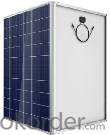
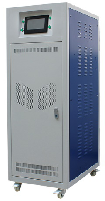
3. Product list
| No. | Item |
| 1 | Solar Panels |
| 2 | PV Inverter with controller built-in |
| 3 | Controller |
| 4 | Mounting racks |
| 5 | DC Cables |
| 6 | AC Cables |
| 7 | MC4 Connectors |
| 8 | GEL Battery |
| 9 | Combiner Box |
| 10 | Distribution box |
4. Remark
- In rainy days, the battery can support10000W load work 13hours.
-The maximum power load should not exceed 10.5KW (including inductive load impact: such as refrigerators, air conditioners, washing machines, etc. with motor load).
- The battery can be fully charged in 10-12hours under STC sunshine condition.
5. Package
Wooden case or carton pallet packing


- Q: What is the average payback period for a solar energy system?
- The average payback period for a solar energy system varies depending on various factors such as the initial cost of the system, location, energy usage, available incentives, and financing options. However, on average, it typically ranges from 5 to 10 years.
- Q: Can solar energy systems be used in areas with high altitude?
- Yes, solar energy systems can be used in areas with high altitude. In fact, solar panels can be even more effective in such areas due to the increased solar irradiance at higher altitudes. However, it is important to consider factors like temperature, snowfall, and extreme weather conditions that may affect the performance and maintenance of solar energy systems in high altitude areas.
- Q: What is the maintenance schedule for a solar energy system?
- The maintenance schedule for a solar energy system typically involves regular inspections and cleanings to ensure optimal performance and efficiency. Additionally, it is recommended to check the connections, wiring, and inverter functionality periodically. Most manufacturers provide guidelines on maintenance tasks, and it is advisable to follow their recommendations to ensure the longevity and reliability of the system.
- Q: Is it possible to store excess solar energy for later use?
- Yes, it is possible to store excess solar energy for later use. This can be done through various methods such as using batteries, pumped hydro storage, or converting the energy into hydrogen or other forms of fuel for later use.
- Q: Can solar energy systems be used for powering agricultural machinery?
- Yes, solar energy systems can be used to power agricultural machinery. Solar panels can generate electricity which can be stored in batteries or directly used to power machinery such as irrigation systems, pumps, tractors, and other farming equipment. This allows farmers to reduce their reliance on fossil fuels, lower operating costs, and promote sustainable farming practices.
- Q: Can solar energy systems be used in powering electric fences or security systems?
- Certainly, electric fences or security systems can be powered by solar energy systems. The conversion of sunlight into energy by solar panels enables the generation of electricity, which can be stored in batteries or used directly to operate different devices. This renders solar energy systems a feasible and sustainable alternative for powering electric fences or security systems, particularly in remote or off-grid areas where conventional power sources may not be accessible or dependable. Solar-powered electric fences effectively discourage intruders or confine animals within a specific area, while solar-powered security systems provide continuous surveillance and monitoring without the requirement of a constant electricity supply. Moreover, solar energy systems are eco-friendly and aid in reducing carbon emissions related to traditional power sources, thus becoming an increasingly sought-after and cost-efficient solution for diverse applications, including electric fences and security systems.
- Q: Can solar energy systems be used for powering electric car wash systems?
- Yes, solar energy systems can be used to power electric car wash systems. Solar energy systems use photovoltaic panels to convert sunlight into electricity. This electricity can then be used to power various electrical devices, including car wash systems. By installing solar panels on the roof of a car wash facility or nearby structure, the generated solar power can be directly used to power the electric motors, pumps, and other equipment required for a car wash system. This not only reduces the reliance on traditional grid electricity but also helps to lower operating costs and decrease the carbon footprint of the car wash facility. Additionally, solar energy systems can store excess energy in batteries, allowing for uninterrupted operation even during periods of low sunlight or at night.
- Q: Can a solar energy system be connected to the grid?
- Yes, a solar energy system can be connected to the grid. In fact, grid-connected solar systems are quite common and allow for excess electricity generated by the solar panels to be fed back into the grid, earning credits or payments through net metering programs. This helps in reducing reliance on traditional energy sources and contributes to the overall stability and sustainability of the grid.
- Q: How much sunlight do solar panels need to generate electricity?
- Solar panels need direct sunlight to generate electricity. The amount of sunlight required varies depending on factors such as panel efficiency and geographical location. However, as a general guideline, solar panels typically need about 4-5 hours of direct sunlight per day to generate a significant amount of electricity.
- Q: How does the quality of solar panels affect their performance?
- The quality of solar panels directly affects their performance. Higher quality panels tend to have better conversion efficiency, meaning they can convert a higher percentage of sunlight into electricity. They also tend to be more durable and have a longer lifespan, which means they can continue to generate electricity efficiently over a longer period of time. In contrast, lower quality panels may have lower efficiency, degrade faster, and be more prone to failure, resulting in reduced performance and shorter lifespans. Therefore, investing in higher quality solar panels is crucial for maximizing their performance and long-term benefits.
Send your message to us
25kw Solar Off-Grid Power System - Solar Energy Systems Bowral
- Loading Port:
- China main port
- Payment Terms:
- TT OR LC
- Min Order Qty:
- 1 set
- Supply Capability:
- 500 set/month
OKorder Service Pledge
OKorder Financial Service
Similar products
Hot products
Hot Searches
Related keywords
